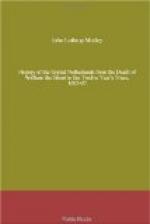Evidently it was a different matter dealing with this many-headed roaring beast, calling itself a republic, from managing the supple politicians with whom he was more familiar. The noise and publicity of these transactions were already somewhat appalling to the smooth friar who was accustomed to negotiate in comfortable secrecy. He now vehemently protested that never man was more sincere than he, and implored for time to send to Brussels for another power. It is true that number three was still in his portfolio, but he had seen so much indignation on the production of number two as to feel sure that the fury of the States would know no bounds should he now confess that he had come provided with a third.
It was agreed accordingly to wait eight days, in which period he might send for and receive the new power already in his possession. These little tricks were considered masterly diplomacy in those days, and by this kind of negotiators; and such was the way in which it was proposed to terminate a half century of warfare.
[The narrative is the
monk’s own, as preserved by his admirer,
the Jesuit Gallucci,
(ubi sup.)]
The friar wrote to his masters, not of course to ask for a new power, but to dilate on the difficulties to be anticipated in procuring that which the losing party is always most bent upon in circumstances like these, and which was most ardently desired by the archdukes—an armistice. He described Prince Maurice as sternly opposed to such a measure, believing that temporary cessation of hostilities was apt to be attended with mischievous familiarity between the opposing camps, with relaxation of discipline, desertion, and various kinds of treachery, and that there was no better path to peace than that which was trampled by contending hosts.
Seven days passed, and then Neyen informed the States that he had at last received a power which he hoped would prove satisfactory. Being admitted accordingly to the assembly, he delivered an eloquent eulogy upon the sincerity of the archdukes, who, with perhaps too little regard for their own dignity and authority, had thus, for the sake of the public good, so benignantly conceded what the States had demanded.
Barneveld, on receiving the new power, handed to Neyen a draught of an agreement which he was to study at his leisure, and in which he might suggest alterations. At the same time it was demanded that within three months the written consent of the King of Spain to the proposed negotiations should be produced. The Franciscan objected that it did not comport with the dignity of the archdukes to suppose the consent of any other sovereign needful to confirm their acts. Barneveld insisted with much vehemence on the necessity of this condition. It was perfectly notorious, he said, that the armies commanded by the archdukes were subject to the King of Spain, and were called royal armies. Prince Maurice observed that all prisoners taken by him had uniformly called themselves soldiers of the Crown, not of the archdukes, nor of Marquis Spinola.




